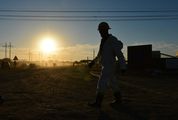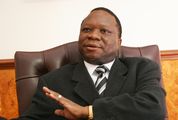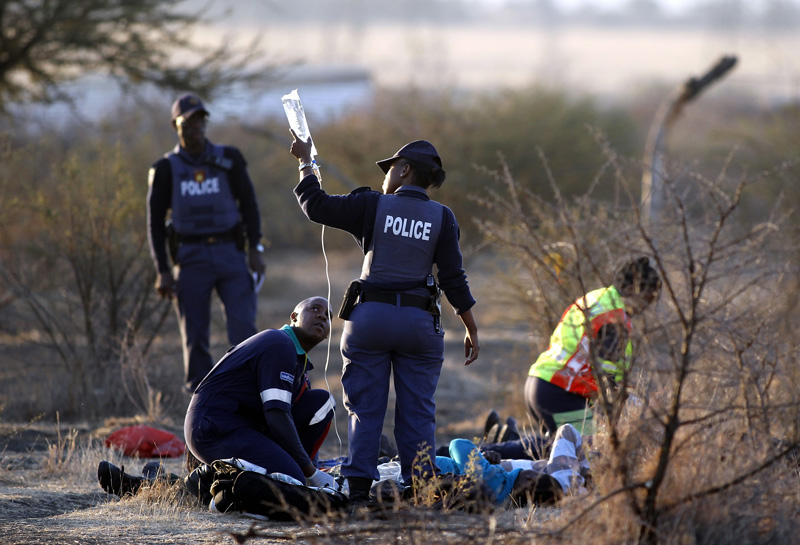LONMIN’s tragic strike worsened on Thursday when police shot and killed at least 30 people at its Marikana mine in North West — bringing the death toll in the week-long strike to more than 40 and casting a pall over South Africa’s platinum sector.
South Africans watched their TV screens in horror as the bloody drama unfolded, in scenes reminiscent of the worst of the apartheid-era massacres, and likely to have been viewed around the world last night.
African National Congress spokesman Jackson Mthembu said it needed to be determined who had caused the confrontation.
“All of us feel very saddened by the violence we have seen on television,” Mr Mthembu said.
Thirty-four people were killed in Thursday's clashes, national police commissioner Mangwashi Phiyega said on Friday.
“The total deaths of the protesters stands at 34 with more than 78 injured,” she told reporters, adding that 259 people were arrested and six firearms recovered.
That brings the total number of people killed at the mine in the past week to 44, including the 10 people who were killed during protests that started last Friday.
The police operation was ostensibly mounted to disperse 3,000 protesting drill operators massed on an outcrop near the mine, 100km northwest of Johannesburg.
The standoff involved heavily armed members of the SAPS tactical response unit and the national intervention unit, and members of the Association for Mineworkers and Construction Union (Amcu), which is intent on replacing the National Union of Mineworkers (NUM).
Many of the protesters were armed with machetes and sticks.
Some commentators likened the scenes to apartheid-era footage of ranks of police opening fire on crowds of protesters in townships.
“I cannot think of a confrontation between protesters and police since 1994 that has taken place along these lines,” said Nic Borain, an independent political analyst.
The Azanian People’s Organisation likened the police action to the Sharpeville massacre of 1960.
The DA, Inkatha Freedom Party (IFP) and African People’s Convention called for an inquiry into the police’s heavy-handed action.
“We call on the president to order a full, expedited and independent investigation of whether police action was justified, proportional and necessary under the circumstances,” Mario Oriani-Ambrosini, IFP justice spokesman, said.
“The families of everyone involved, and indeed the nation, deserve to know how and why this bloodshed occurred,” the DA said.
President Jacob Zuma said he was “shocked and dismayed” at the senseless violence at the mine.
“I have instructed law enforcement agencies to do everything possible to bring the situation under control and to bring the perpetrators of violence to book,” he said.
“We call upon the labour movement and business to work with government to arrest the situation before it deteriorates any further.”
Lonmin has lost 15,000 ounces of platinum production since the illegal strike started last Friday, and has now halted production at all its South African operations. Its shares fell 7.34% to R83.70. To cap the bad news, its CEO Ian Farmer was yesterday diagnosed with a serious illness and was hospitalised.
World platinum prices leapt as much as $30/oz — more than 2% — to a six-day high as the extent of the violence became apparent, as South Africa has 80% of known reserves.
Lonmin chairman Roger Phillimore said: “The SAPS have been in charge of public order and safety on the ground since the violence between competing labour factions erupted over the weekend.
“It goes without saying that we deeply regret the further loss of life in what is clearly a public order rather than labour relations associated matter.”
While South Africa has most of the world’s known platinum reserves, rising electricity and labour costs, combined with a sharp drop in the price of the metal, have left many mines struggling to keep afloat.
Thursday’s drama unfolded after striking workers, who are demanding salaries of R12,500 a month, set up base at the top of a hill near the Wonderkop settlement at Lonmin’s Western Platinum mine.
The shootout lasted about three minutes, and it was unclear who fired first — police or armed workers. Officers cordoned off the scene and created a razor-wire barrier.
NUM president Senzeni Zokwana called for a “thorough investigation”.
“You don’t put people on strike without following the proper procedure.... this is a threat to the mining interests of the country, global investors are watching this,” he said.
On eNews on Thursday night, Congress of South African Trade Unions secretary-general Zwelinzima Vavi hinted that African People’s Convention leader Themba Godi was responsible, which he denied.
“I can categorically state that we have nothing to do with what happened at Lonmin. It’s a massacre, and heads should roll, including the police minister and national police commissioner,” Mr Godi said.
Before the start of the operation by hundreds of police, officials said talks with Amcu leaders had broken down, leaving no option but to use force to break up the crowd, which had triggered the closure of the mine. “Today is unfortunately D-day,” police spokesman Dennis Adriao had said.
Recriminations flew thick and fast on Thursday night, and leaders of Amcu accused police of a massacre.
“There was no need whatsoever for these people to be killed like that,” Amcu general secretary Jeffrey Mphahlele said.
Police Minister Nathi Mthethwa’s office extended its sympathies to the families of the victims,
“The minister is now considering requesting the president to institute a full inquiry, not just around what happened today but holistically at this situation,” said spokesman Zweli Mnisi. He said, however: “Now what should police do in such situations when clearly what they are faced with are armed and hardcore criminals who murder police?”
Mr Mnisi said police initially tried to peacefully disperse the crowd, to the point of using water cannons and teargas, but this did not help.
“We had a situation where people who were armed to the teeth, attacked and killed others even police officers and, for the record, one of the firearms used was that of our deceased police officer.
“What happened is something that was unfortunate and should not have happened in post-democracy South Africa because to protest is a legal and constitutional right of any citizen.”
Chanting could be heard from an informal settlement near the mine on Thursday night. It was not clear if the group, who were singing liberation songs, were armed, but police were keeping watch.
With Reuters, Sapa

BLOODSHED: Police officers give instructions to an injured miner after striking miners were shot outside Lonmin’s Marikana platinum mine on Thursday. Picture: REUTERS
LONMIN’s tragic strike worsened on Thursday when police shot and killed at least 30 people at its Marikana mine in North West — bringing the death toll in the week-long strike to more than 40 and casting a pall over South Africa’s platinum sector.
South Africans watched their TV screens in horror as the bloody drama unfolded, in scenes reminiscent of the worst of the apartheid-era massacres, and likely to have been viewed around the world last night.
African National Congress spokesman Jackson Mthembu said it needed to be determined who had caused the confrontation.
“All of us feel very saddened by the violence we have seen on television,” Mr Mthembu said.
Thirty-four people were killed in Thursday's clashes, national police commissioner Mangwashi Phiyega said on Friday.
“The total deaths of the protesters stands at 34 with more than 78 injured,” she told reporters, adding that 259 people were arrested and six firearms recovered.
That brings the total number of people killed at the mine in the past week to 44, including the 10 people who were killed during protests that started last Friday.
The police operation was ostensibly mounted to disperse 3,000 protesting drill operators massed on an outcrop near the mine, 100km northwest of Johannesburg.
The standoff involved heavily armed members of the SAPS tactical response unit and the national intervention unit, and members of the Association for Mineworkers and Construction Union (Amcu), which is intent on replacing the National Union of Mineworkers (NUM).
Many of the protesters were armed with machetes and sticks.
Some commentators likened the scenes to apartheid-era footage of ranks of police opening fire on crowds of protesters in townships.
“I cannot think of a confrontation between protesters and police since 1994 that has taken place along these lines,” said Nic Borain, an independent political analyst.
The Azanian People’s Organisation likened the police action to the Sharpeville massacre of 1960.
The DA, Inkatha Freedom Party (IFP) and African People’s Convention called for an inquiry into the police’s heavy-handed action.
“We call on the president to order a full, expedited and independent investigation of whether police action was justified, proportional and necessary under the circumstances,” Mario Oriani-Ambrosini, IFP justice spokesman, said.
“The families of everyone involved, and indeed the nation, deserve to know how and why this bloodshed occurred,” the DA said.
President Jacob Zuma said he was “shocked and dismayed” at the senseless violence at the mine.
“I have instructed law enforcement agencies to do everything possible to bring the situation under control and to bring the perpetrators of violence to book,” he said.
“We call upon the labour movement and business to work with government to arrest the situation before it deteriorates any further.”
Lonmin has lost 15,000 ounces of platinum production since the illegal strike started last Friday, and has now halted production at all its South African operations. Its shares fell 7.34% to R83.70. To cap the bad news, its CEO Ian Farmer was yesterday diagnosed with a serious illness and was hospitalised.
World platinum prices leapt as much as $30/oz — more than 2% — to a six-day high as the extent of the violence became apparent, as South Africa has 80% of known reserves.
Lonmin chairman Roger Phillimore said: “The SAPS have been in charge of public order and safety on the ground since the violence between competing labour factions erupted over the weekend.
“It goes without saying that we deeply regret the further loss of life in what is clearly a public order rather than labour relations associated matter.”
While South Africa has most of the world’s known platinum reserves, rising electricity and labour costs, combined with a sharp drop in the price of the metal, have left many mines struggling to keep afloat.
Thursday’s drama unfolded after striking workers, who are demanding salaries of R12,500 a month, set up base at the top of a hill near the Wonderkop settlement at Lonmin’s Western Platinum mine.
The shootout lasted about three minutes, and it was unclear who fired first — police or armed workers. Officers cordoned off the scene and created a razor-wire barrier.
NUM president Senzeni Zokwana called for a “thorough investigation”.
“You don’t put people on strike without following the proper procedure.... this is a threat to the mining interests of the country, global investors are watching this,” he said.
On eNews on Thursday night, Congress of South African Trade Unions secretary-general Zwelinzima Vavi hinted that African People’s Convention leader Themba Godi was responsible, which he denied.
“I can categorically state that we have nothing to do with what happened at Lonmin. It’s a massacre, and heads should roll, including the police minister and national police commissioner,” Mr Godi said.
Before the start of the operation by hundreds of police, officials said talks with Amcu leaders had broken down, leaving no option but to use force to break up the crowd, which had triggered the closure of the mine. “Today is unfortunately D-day,” police spokesman Dennis Adriao had said.
Recriminations flew thick and fast on Thursday night, and leaders of Amcu accused police of a massacre.
“There was no need whatsoever for these people to be killed like that,” Amcu general secretary Jeffrey Mphahlele said.
Police Minister Nathi Mthethwa’s office extended its sympathies to the families of the victims,
“The minister is now considering requesting the president to institute a full inquiry, not just around what happened today but holistically at this situation,” said spokesman Zweli Mnisi. He said, however: “Now what should police do in such situations when clearly what they are faced with are armed and hardcore criminals who murder police?”
Mr Mnisi said police initially tried to peacefully disperse the crowd, to the point of using water cannons and teargas, but this did not help.
“We had a situation where people who were armed to the teeth, attacked and killed others even police officers and, for the record, one of the firearms used was that of our deceased police officer.
“What happened is something that was unfortunate and should not have happened in post-democracy South Africa because to protest is a legal and constitutional right of any citizen.”
Chanting could be heard from an informal settlement near the mine on Thursday night. It was not clear if the group, who were singing liberation songs, were armed, but police were keeping watch.
With Reuters, Sapa
























Change: 0.87%
Change: 0.92%
Change: 0.52%
Change: 1.04%
Change: 1.17%
Data supplied by Profile Data
Change: 0.00%
Change: 0.00%
Change: 0.87%
Change: 0.00%
Change: 0.00%
Data supplied by Profile Data
Change: -1.39%
Change: -1.07%
Change: -1.13%
Change: -1.47%
Change: -1.16%
Data supplied by Profile Data
Change: 0.00%
Change: 0.00%
Change: 0.00%
Change: 0.00%
Change: 0.00%
Data supplied by Profile Data